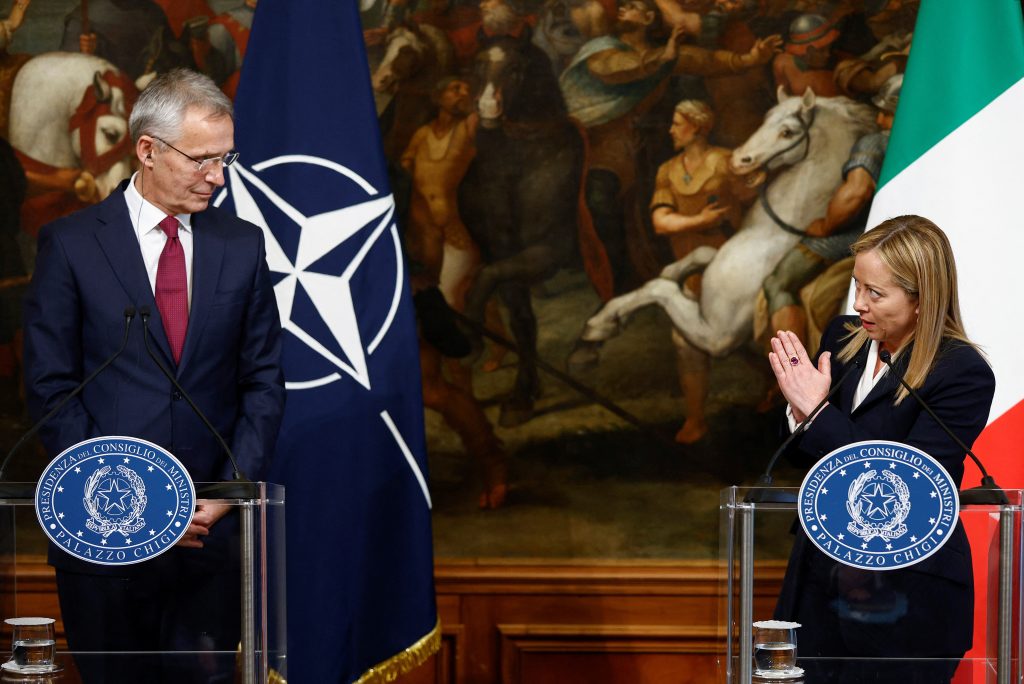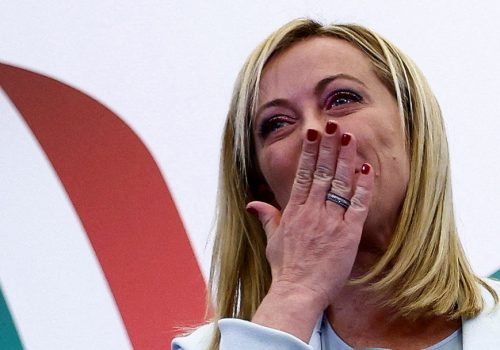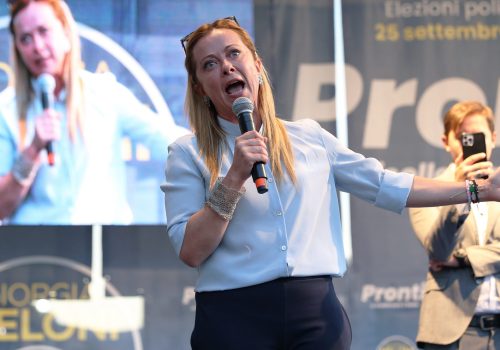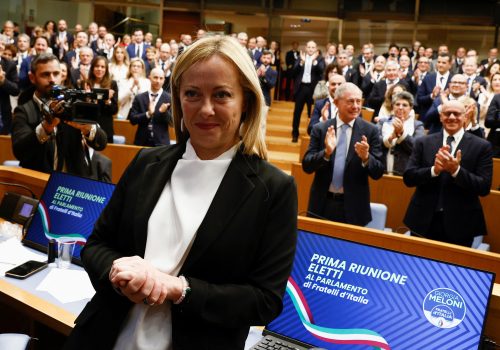Italian politics are hardly known for either stability or continuity. Just over the last decade, the country has had eight governments and seven prime ministers. Among major economies, only Britain has seen comparable political instability—with five prime ministers and eight governments in this period.
Against that backdrop, Mario Draghi had brought about a sense of steady leadership, presided over economic growth, and instituted a strong European and transatlantic agenda, leading with competence and resolve since entering office in Italy in February 2021. Underscoring his role as an internationally respected leader, Draghi propelled Italy to the forefront of European Union (EU) decisionmaking, securing hundreds of billions of dollars for COVID-19 relief, drafting a path for Italy’s independence from Russian natural gas, and helping lead the bloc’s response to Russia’s invasion of Ukraine. And yet, seemingly overnight, his short stint in office ended.
Following the country’s September snap election, a center-right coalition led by Giorgia Meloni (leader of the right-wing Brothers of Italy party) won an outright majority—but it has been plagued by scandals and infighting ever since. As the EU’s third-largest economy and a member of the Group of Seven (G7), Italian domestic politics risk spilling across borders and testing EU and NATO unity in the face of Russian aggressions.
Parting from more traditionally domestic-focused agendas, there has already been friction among governing coalition parties over Italy’s continued policy of support toward Ukrainian President Volodymyr Zelenskyy. In fact, two of the three parties in the ruling coalition are publicly and privately calling into question Italy’s support for Ukraine, and in doing so jeopardizing the governing alliance’s unity and the country’s response to continued hostilities.
At a time when the country and Europe at large are preparing for a difficult winter plagued by an energy crisis, Italy seems poised to plunge back to its historical pattern of political instability.
Meloni has gone to great lengths to paint herself as a leader who is a Brussels skeptic, but at the same time is pro-European and an anti-Vladimir Putin transatlanticist. Calling for Italy to exit the EU just years ago, she is now making public appearances arguing for Italy’s immovable role within the bloc and NATO. Last week she visited Brussels to meet EU leaders, and then this week she hosted NATO Secretary General Jens Stoltenberg at Chigi Palace. However, her coalition partners are her biggest weakness in this effort. And throughout the campaign, Meloni tied herself to these partners, presenting a unitary agenda and often making joint appearances at rallies.
Matteo Salvini, head of Italy’s The League party is positioning himself as a pacifist, calling for peace talks as the only possible end to the war. While pacifism is likely a political stunt, as Salvini has historically been close to Italy’s branches of the military and a firearms enthusiast, The League’s ties to Putin’s United Russia party are no secret. Salvini’s own party loyalists have been reported to have taken repeated secret meetings at the Kremlin for years. Salvini himself claimed to have secretly met with the Russian ambassador to Italy since the beginning of the war.
Silvio Berlusconi’s Forza Italia party, the coalition’s other partner, has turned into Meloni’s biggest headache. Forza Italia’s second-in-command, Antonio Tajani, will become the country’s next minister of foreign affairs, but his appointment has been overshadowed by Berlusconi.
Since election day, Berlusconi—who is arguably the country’s most pro-Putin major public figure—has repeatedly gone on national television (on which he has a near-monopoly, controlling the country’s largest TV network, Mediaset, and having a say over the political appointment of the heads of the state-owned network, Rai) to amplify Kremlin propaganda. He has suggested that Ukraine brought the war upon itself. In secret recordings now made public, he has gone as far as to say his dear friend Putin is being treated unfairly and praised him for a recent birthday gift, while blaming Zelenskyy for escalating violence in the Donbas.
Now as prime minister, Meloni is forced to distance herself from Salvini’s and Berlusconi’s comments. Where they see in the war in Ukraine an opportunity to tap into Italians’ frustrations with rising costs of living and shift support away from Brothers of Italy for added leverage within the governing coalition, Meloni sees a path to swift recognition and support from the broader Western international establishment, just months after many feared her rise to power.
With no end in sight to the ongoing center-right coalition internal fights, Draghi’s time as prime minister makes one thing clear: The transatlantic alliance and Europe need a stable and constructive partner in Rome now more than ever. Yet as the bloc prepares to face what will surely be a difficult winter, with energy and geopolitical crises looming, Italy still lacks a unified government. With newly elected pro-Russian legislators and politicians known to have been soft on Russia now appointed to key ministries, Rome risks further emboldening a growing segment within European politics that is calling for disengagement from the conflict. Were this segment to succeed, it would shed light on the extent to which Russian narratives have infiltrated European politics over the past decade.
Draghi helped lead Europe’s response to the war in Ukraine and worked behind the scenes to mediate between France and Germany, as the two other main European powers continue clashing on their responses to the energy crisis. Now, Meloni faces the difficult task of trying to build on Draghi’s European legacy while being hobbled by alliance partners who don’t share her views on either the EU or Russia. There’s much at stake—and at risk—for Meloni, Italy, and Europe.
Nick O’Connell is assistant director for business development at the Atlantic Council. A native of Italy, he previously worked for Migrants of the Mediterranean, an Italy-based nonprofit focused on EU migration policy, and a number of political campaigns in Northern Italy.
Further reading
Mon, Sep 26, 2022
Which Giorgia Meloni will Washington get?
New Atlanticist By Alissa Pavia
The Biden administration should adopt a more cautious approach toward the next Italian prime minister than it has so far.
Thu, Sep 22, 2022
Could Italy become Europe’s newest problem child?
New Atlanticist By Ilva Tare, Akshat Dhankher
How a new right-wing coalition could shake up Europe's third-largest economy.
Mon, Oct 17, 2022
Italy recently elected a far-right leader. Here’s how the Arab world reacted to the news.
MENASource By Karim Mezran, Nour Dabboussi
Giorgia Meloni’s government should carefully consider how it handles its nationalistic discourse to avoid any Islamophobic controversies that could ultimately spark a blowback of condemnations from its allies in the Arab world.
Image: Italian Prime Minister Giorgia Meloni gestures next to NATO Secretary General Jens Stoltenberg following their meeting at Chigi Palace in Rome, Italy November 10, 2022. REUTERS/Guglielmo Mangiapane



